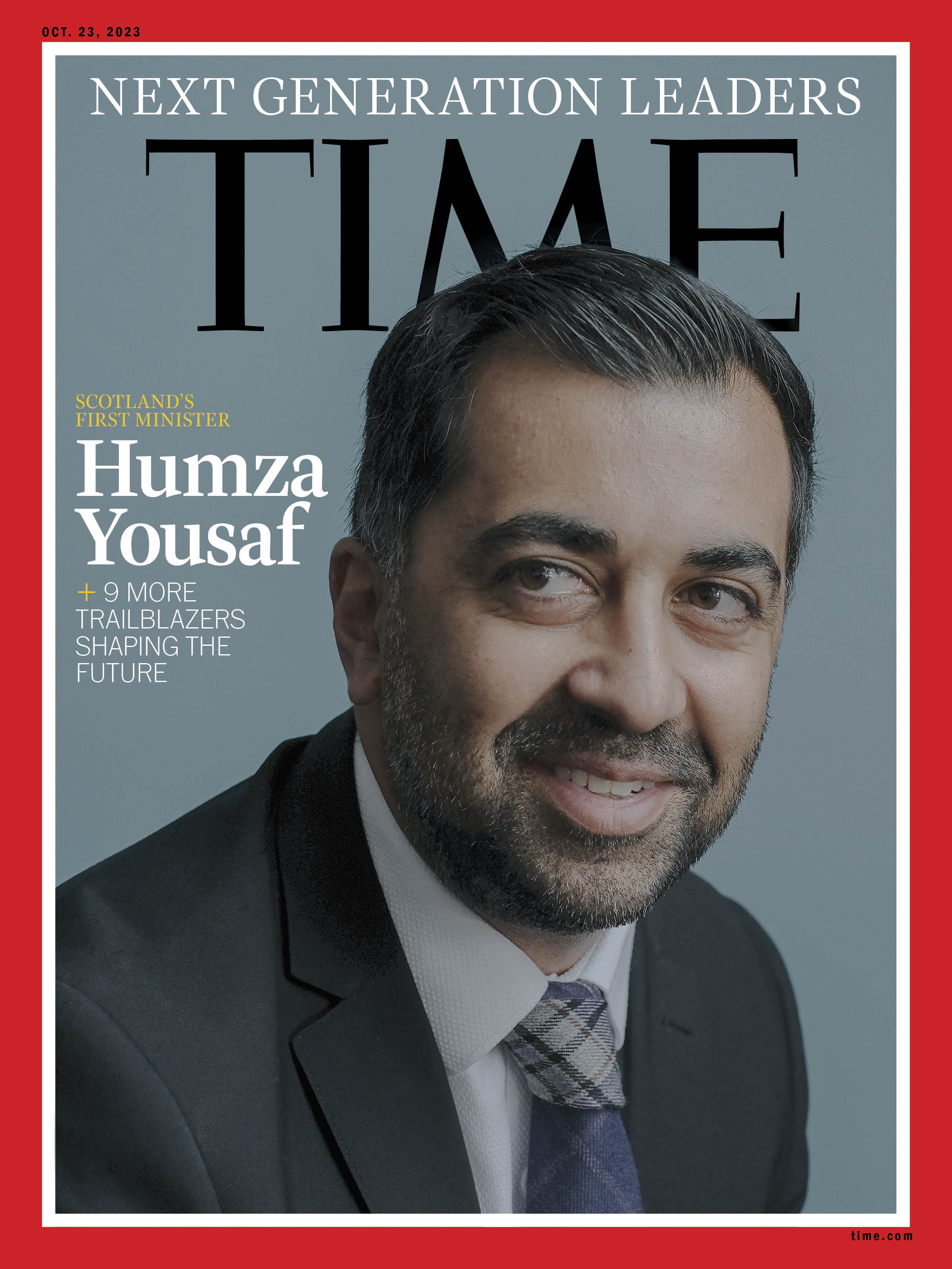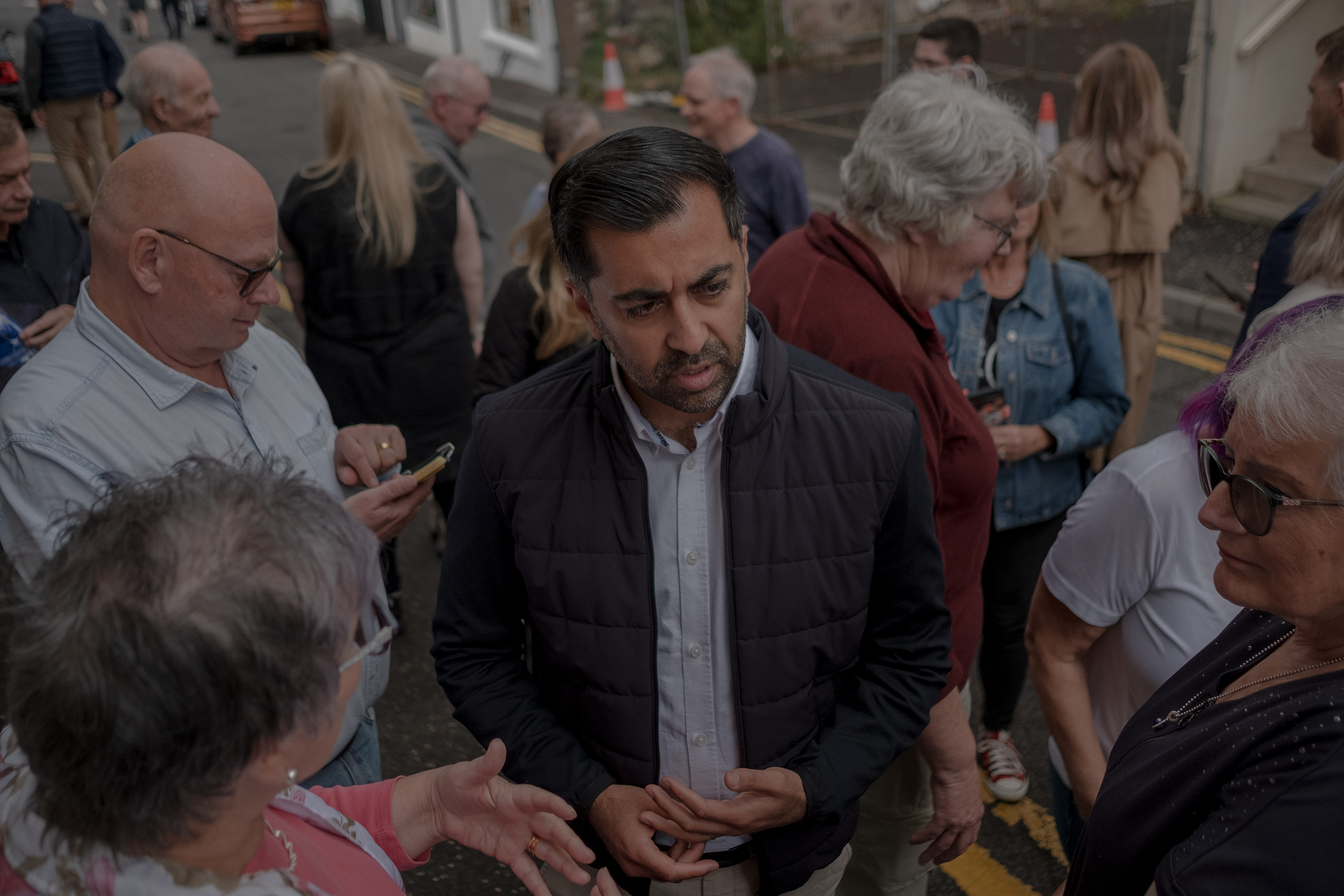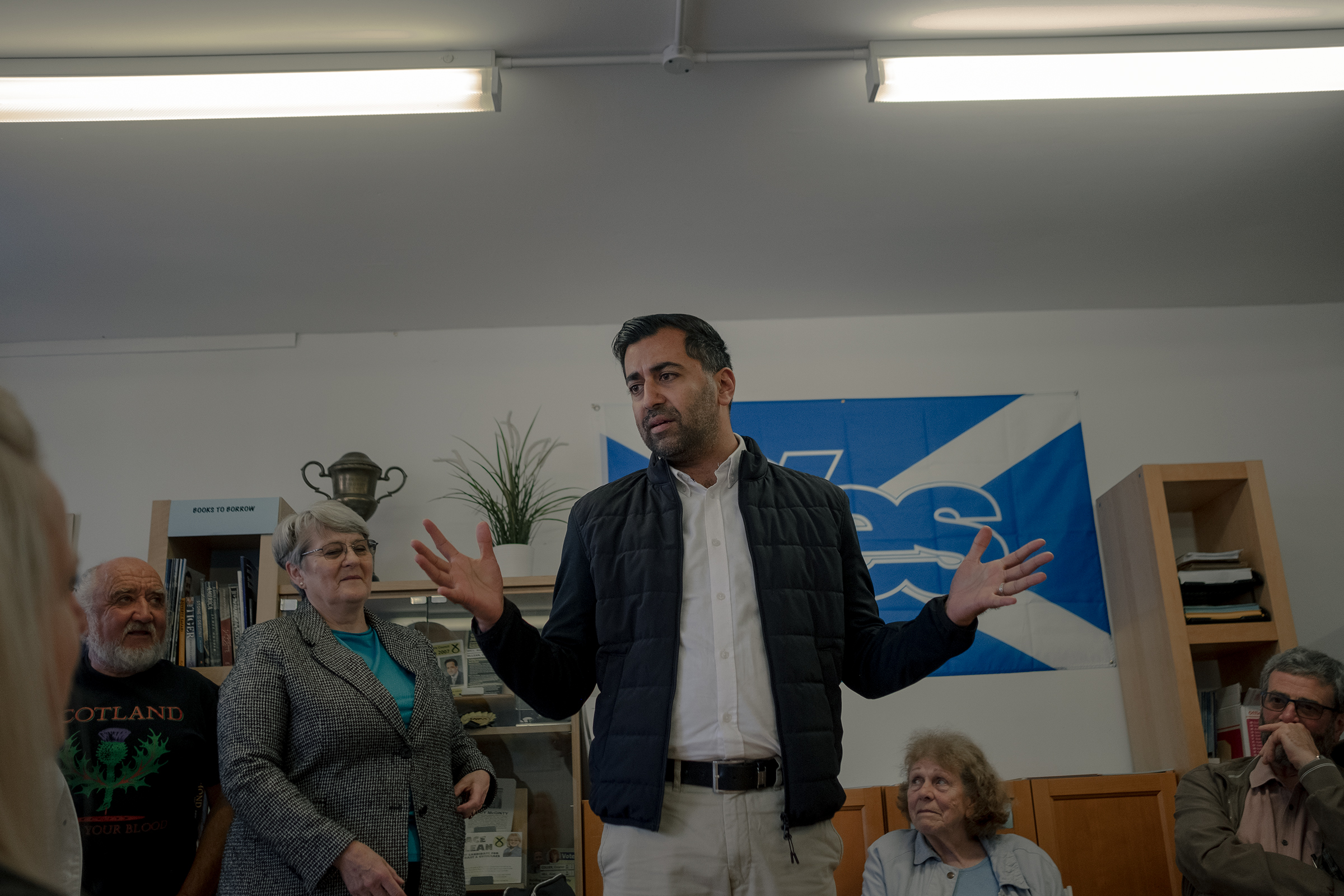Back in August, TIME traveled to Edinburgh to meet with Scottish First Minister Humza Yousaf—the first Muslim politician ever elected to lead a Western democracy, as well as the first non-white and youngest Scottish leader—for a new cover story, in what was his first major interview with foreign media. At that time, Yousaf had been in post for just under five months; he succeeded his colleague and friend, the longtime Scottish leader Nicola Sturgeon, at the end of March following her shock resignation one month earlier.
Unlike most new leaders, Yousaf did not get a honeymoon period—quite the opposite, in fact. His brief tenure has been rocked by the arrest of three senior SNP figures, including Sturgeon and her husband Peter Murrell (all three have since been released), as part of an ongoing police probe into the party’s finances; internal strife; and polls projecting that the party could lose as many as half of its seats in the U.K. Parliament in Westminster when Britons go to the polls for a general election expected next year. Over the course of our two-hour meeting, we discussed the historic nature of Yousaf’s leadership, the cost-of-living crisis and other challenges facing Scotland, and how he plans to achieve his party’s overriding objective: Scottish independence.
Read More: Meet the New Face of Scotland
Here are five takeaways from Yousaf’s wide-ranging conversation with TIME.

1. There is no clear path toward achieving Scottish independence
Since the U.K. Supreme Court ruled last year that Scotland does not have the power to hold an independence referendum without the consent of the British government, the path forward for the independence movement appears to have hit a dead end. Westminster is adamant that the 2014 referendum, which saw 55% of Scots vote against independence, was the final word on the matter. The SNP argues that the scale of change in the U.K. since then, most notably its decision to leave the E.U., entitles Scots to another vote.
Before quitting office in February, Sturgeon briefly floated the idea of treating the next U.K. general election as a “de facto referendum” on independence—a position that many within the party, including Yousaf, distanced themselves from. During our conversation, Yousaf said getting the U.K. government to agree to sanction a referendum would always be the “preferred option,” but that absent such cooperation, the SNP should instead focus on building a consistent majority for independence that Westminster cannot possibly ignore. This after all was how Scotland secured its own Parliament following the 1997 devolution referendum, in which Scots voted overwhelmingly for its creation. And while Yousaf concedes that Scottish independence doesn’t claim the support of a consistent majority of Scots, he believes it’s only a matter of time before it does.
“If we can demonstrate that independence has a consistent majority—not 52% one day, 48% the other day,” says Yousaf, “then it’ll be impossible for the U.K. government to continue and continue and continue to deny.” SNP members will get their chance to vote on the party’s independence strategy when they meet for their annual conference later this month in Aberdeen.
2. Yousaf believes the Labour Party is taking Scotland for granted
For British opposition leader Keir Starmer—who is widely expected to become Britain’s next Prime Minister should his center-left Labour Party defeat the Conservatives at the next general election—the road to 10 Downing Street will almost certainly run through Scotland. (So dominant has the SNP been in Scotland that Labour claims only one of the 59 Scottish seats in Westminster and just 22 of the 129 seats in the Scottish Parliament.) It is in Scotland that many political observers believe the Labour Party must win big in order to secure a governing majority in Britain.

The fight for Scotland begins today, in a by-election near Glasgow, where the SNP is defending one of its U.K. Parliament seats against the ascendant Scottish Labour Party. The by-election, which was triggered after now-former SNP lawmaker Margaret Ferrier was found to have broken lockdown rules during the COVID-19 pandemic, is projected to result in a Labour victory. Yousaf, for whom this contest constitutes his first electoral test as SNP leader, concedes that the race was always “going to be a tough one” given the circumstances. “But Labour are wrong to already put out the bunting and pop the champagne corks,” he says. “I think that takes people for granted. I know a thing or two about people in Scotland, having knocked on as many doors as I have, and they don’t like people taking them for granted.”
As for Starmer, Yousaf says that the more the Labour leader aligns himself with Conservative welfare policies and climate positions, the more skeptical Scots will become. “The more he flip flops,” Yousaf says of Starmer, “I think people will just see him for what he is, and that’s somebody who lacks any vision or ambition for the country. He just wants to get to Number 10 and if he needs to hang on the coattails of Conservative policies to do that, I think the people of Scotland will reject that quite roundly.”
Read More: Keir Starmer on His Vision for Fixing Britain
3. He will continue to fight for transgender rights in Scotland
Last year, the Scottish Parliament voted to pass legislation designed to make it easier for people in Scotland to legally change their gender. That legislation was ultimately blocked by the U.K. government in an unprecedented intervention using its veto powers under Section 35 of the Scotland Act—a move that it justified on the grounds that the new law “would have an adverse impact on the operation of Great Britain-wide equalities legislation.”
To the SNP, this represented a direct attack on Scottish democracy. “Members of every single party voted for that legislation; it got passed by a majority of our parliament,” Yousaf says. “What right does another government have to come in and strike a red pen through it, to veto that legislation, to torpedo it? For me, that is not self government. That is not devolution.”
The Scottish government is currently in the process of challenging that decision at the Court of Session, Scotland’s supreme civil court. Despite the contentious nature of the legislation (roughly half of Scots supported the U.K. government’s decision, according to an Ipsos poll), Yousaf says he’ll continue to fight for it. “I’m unequivocal about my belief in the rights of our marginalized communities, including our trans community, because I’m a minority myself,” he explains. “I’ve lived my whole life as a minority in this country, and my rights don’t exist in a vacuum. My rights are completely interdependent on everybody else’s rights and if they are attacking the rights of our trans community or anybody who is in a marginalized minority community, then they’ll come for me next.”

Yousaf’s position stands in marked contrast to Britain’s ruling Conservatives. Speaking at the party’s annual conference in Manchester this week, Sunak told party colleagues that “We shouldn’t be bullied into thinking anyone can be any sex that they want to be. A man is a man and a woman is a woman, that is just common sense.”
4. He argues that the challenges facing Scotland can't be divorced from its place within the U.K.
Much like the rest of the U.K., Scotland is dealing with a cost-of-living crisis and overwhelmed public services. While voters may hold the SNP responsible for those challenges as the government in charge in Scotland for the past 16 years, Yousaf says that these challenges cannot be divorced from its place within the U.K. He says being in the U.K. (and, crucially, outside of the E.U.) has made Scotland poorer and less productive when compared to other European countries of a similar size, such as Ireland, Denmark, and Sweden.
“Being attached to this unequal union is what is holding us back,” he says, “and I believe that weaves its way through every single issue that people are grappling with today.”
5. Yousaf believes that his historic leadership, and that of other minority leaders across the U.K., is worth celebrating
On Yousaf’s first night in Bute House, the official residence of the First Minister of Scotland, he posted some photos of his family observing the Islamic holy month of Ramadan in their new home. He admits that he was initially reluctant to do so, fearing a potential online backlash. It was his wife, Nadia El-Nakla, who encouraged him to share them. “Nadia was saying, ‘You should absolutely put that out there because people should realize that being a Muslim in Scotland is normal … So you shouldn't have to hide what is a really important moment for you,’ and this was a really important moment,” Yousaf recalls. The images went viral, garnering millions of views.
Yousaf doesn’t see his achievement in a vacuum, though. “You’re living in a U.K. where the Prime Minister is of Indian descent, the First Minister is of Pakistani heritage, and of course the Mayor of London is of Pakistani descent as well,” Yousaf says. “That says something good about how far the country has moved forward.” He later acknowledged that his chief rival in Scottish Labour leader, Anas Sarwar, also of Pakistani heritage, belongs to this group of trailblazers.
More Must-Reads from TIME
- Donald Trump Is TIME's 2024 Person of the Year
- Why We Chose Trump as Person of the Year
- Is Intermittent Fasting Good or Bad for You?
- The 100 Must-Read Books of 2024
- The 20 Best Christmas TV Episodes
- Column: If Optimism Feels Ridiculous Now, Try Hope
- The Future of Climate Action Is Trade Policy
- Merle Bombardieri Is Helping People Make the Baby Decision
Write to Yasmeen Serhan/Edinburgh, Scotland at yasmeen.serhan@time.com
